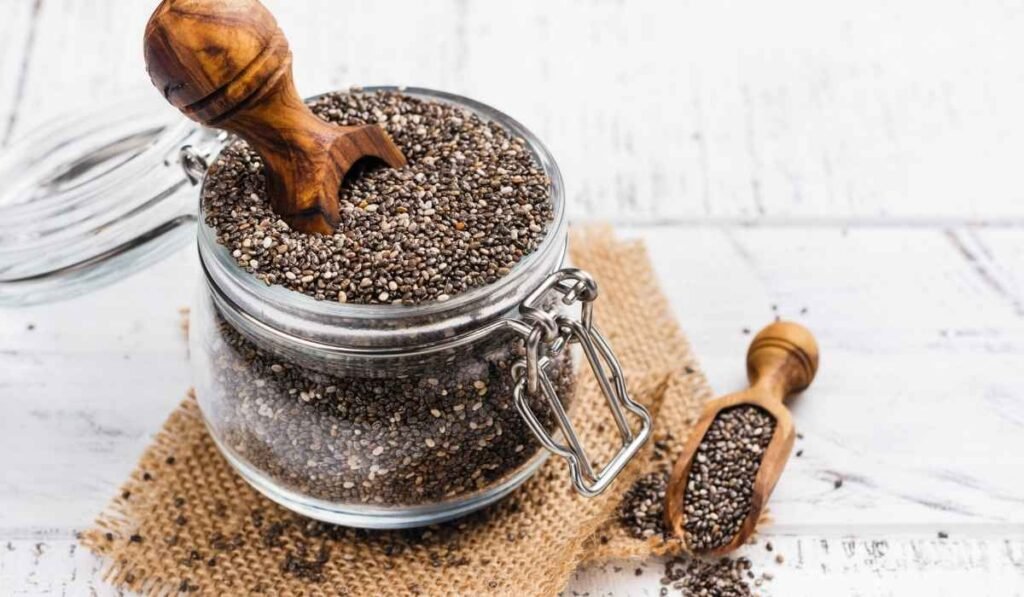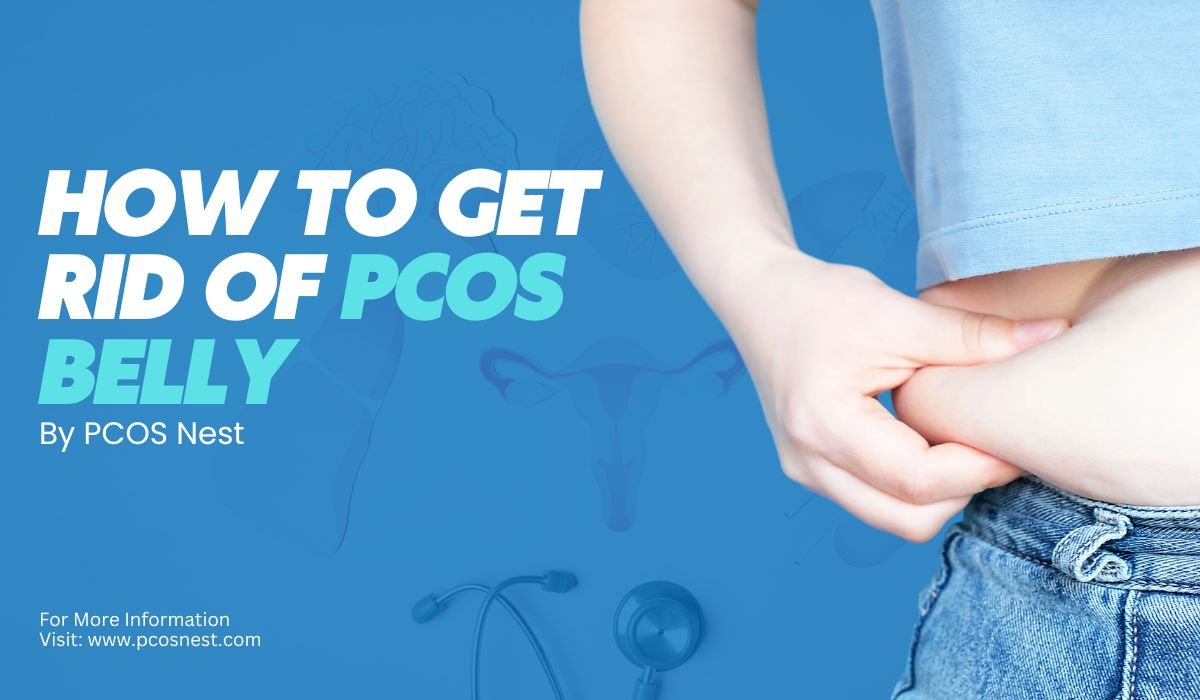If you have PCOS, you might notice extra weight around your belly that’s hard to lose. This PCOS belly happens because of hormone imbalances, especially insulin resistance (the condition in which the body can’t use insulin effectively, due to which there is an increase in insulin production). But don’t worry dear, as now you are at PCOS Nest.

How to Get Rid Of PCOS Belly?
Here I’ll tell you simple steps to get rid of PCOS Belly.
1. Eat Foods That Keep Blood Sugar Stable (Low Glycemic Foods):
Mostly Women with PCOS have insulin resistance, which can make belly fat harder to lose. So eat foods that don’t cause an increase in blood sugar levels, like whole grains (brown rice, oats), vegetables, lean meats, and beans.
Avoid sugary snacks and processed foods as much as possible.
Try to eat smaller meals every few hours and add protein to each meal, such as eggs or chicken, to keep your blood sugar stable.
2. Add More Fiber & Healthy Fats to Your Diet:
Fiber is great because it helps keep you full, improves digestion, and lowers blood sugar levels. High-fiber foods include:
- Oats, whole grains, beans, and vegetables.
- Fruits like apples and berries.
Studies, as discussed in Healing PCOS by Amy Medling, have shown that women with PCOS greatly benefit from fiber-rich diets as they help regulate insulin and weight control.
And Healthy Fats like those found in olive oil and avocados help to reduce cravings and inflammation. Healthy fats slow the absorption of glucose which reduces insulin levels. Lower insulin levels help prevent fat storage, especially around the abdomen.
Healthy fats are also found in Almonds, Walnuts, Pistachios, Flaxseeds, and Chia Seeds which are high in omega-3 fatty acids and can reduce inflammation.

3. Do Balanced Exercises:
Exercise improves insulin sensitivity, boosts metabolism, and can target belly fat.
Build muscle with light weights, resistance bands, or bodyweight exercises like squats and lunges. Muscle burns more calories and helps in fat reduction.
Include walking, jogging, or biking in your daily routine to improve heart health and burn calories. Aim for moderate-intensity cardio exercises 3–5 times per week.
Must Read: Best Exercises for PCOS Belly Fat
Avoid overly intense workouts that may increase stress hormones, which could worsen PCOS symptoms.

4. Get Enough Sleep:
Poor sleep can increase stress hormones like cortisol, which makes it harder to lose belly fat.
Sleep early. Research shows that late-night cortisol release can affect belly fat. Cortisol, a stress hormone, tends to increase when we don’t get enough sleep or have irregular sleep schedules. Staying awake till midnight can disrupt the body’s natural rhythm, and result in a cortisol surge.
Higher cortisol levels can increase abdominal fat storage over time, due to which those who sleep late might experience more belly fat.
Try to keep a regular bedtime.
Turn off screens (like your phone or TV) at least an hour before bed.
Better sleep will help your body balance hormones and make it easier to lose weight.
Also Read: PCOS Food Diet Chart for Weight Loss
5. Reduce Stress:
Stress can raise cortisol levels which results in more belly fat. Reducing stress helps keep PCOS symptoms under control.
- Practice deep breathing or meditation for a few minutes each day.
- Spend time on relaxing hobbies you enjoy.
- Take breaks during the day to relax and avoid feeling overwhelmed.
6. Limit Caffeine Intake and Drink Spearmint Tea:
Excessive caffeine can increase cortisol levels, which may contribute to belly fat. While moderate caffeine consumption (like 1 cup of coffee per day) is generally safe for most people, excessive intake may negatively affect your metabolism, disrupt sleep, and lead to increased fat storage, especially in the abdominal area.
Drinking spearmint tea may help reduce testosterone levels, which are often higher in women with PCOS. This can promote hormone balance, which may support weight loss help reduce symptoms like unwanted hair growth, and reduce belly fat over time.

7. Use Supplements:
Some supplements are known to help manage PCOS symptoms and reduce insulin resistance:
- Inositol: This natural compound (often in Myo- and D-Chiro Inositol forms) can improve insulin sensitivity and balance your hormones, which helps to get rid of belly fat in women with PCOS.
- Omega-3 Fatty Acids: Also found in fish oil & chia seeds, omega-3s can reduce inflammation and cortisol levels.
- Vitamin D: Many women with PCOS have low Vitamin D levels, which can affect insulin and fat distribution. A supplement helps in improving insulin sensitivity and reducing belly fat.
- Magnesium: Helps regulate insulin and reduces stress, which may lower cortisol and prevent belly fat.
- Probiotics: A healthy gut can improve metabolism and help manage weight. Probiotics help in digestion and can help reduce bloating and fat storage.
Note: Must consult with your doctor before using any supplement.
8. Drink Plenty of Water:
Hydration is the key to losing weight. Drinking enough water helps with digestion and keeps you feeling full, which can prevent overeating. Drink at least 8 glasses of water daily. Also, utilize water-rich foods like cucumber and watermelon.
Frequently Asked Questions:
Why does PCOS cause a big belly?
PCOS causes a big belly due to hormonal imbalances, insulin resistance, and inflammation. These factors result in fat storage around the abdomen.
What type of exercise is best for getting rid of PCOS belly?
A mix of strength training, aerobic exercises, and high-intensity interval training (HIIT) can be effective for reducing belly fat. Strength training exercise helps in building muscle, which boosts metabolism, while aerobic and HIIT exercises can help in burning calories and fat.
Is a PCOS belly hard or soft?
A PCOS belly is hard. This is because PCOS-related belly fat tends to accumulate around the organs (visceral fat) rather than just under the skin (subcutaneous fat). Visceral fat increases abdominal firmness and can be harder to lose than other types of fat. A PCOS belly often leads to a higher waist-to-hip ratio, typically over 0.87, which gives an “apple-shaped” appearance.
What should not be eaten in PCOS?
In PCOS, avoid sugary foods, refined carbs (white bread, pasta), processed foods, dairy (if sensitive), red and processed meats, and limit caffeine and alcohol. These foods can worsen insulin resistance, inflammation, and hormone imbalance.
In conclusion, reducing PCOS belly requires a combination of healthy habits. Making small, consistent changes to your daily habits can greatly improve your health and help you manage PCOS symptoms more effectively over time. Your patience will lead to success soon.

